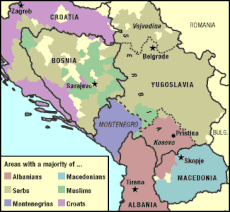| UN Security Council Resolution 1186 | ||
|---|---|---|
 Ethnic groups in the former Yugoslavia | ||
| Date | 21 July 1998 | |
| Meeting no. | 3,911 | |
| Code | S/RES/1186 (Document) | |
| Subject | The situation in the former Yugoslav Republic of Macedonia | |
Voting summary |
| |
| Result | Adopted | |
| Security Council composition | ||
Permanent members | ||
Non-permanent members | ||
| ||
United Nations Security Council resolution 1186, adopted unanimously on 21 July 1998, after recalling resolutions 1105 (1997) and 1110 (1997), the Council extended and strengthened the mandate of the United Nations Preventive Deployment Force (UNPREDEP) in Macedonia until 28 February 1999.[1]
The resolution noted that the UNPREDEP mission played an important role in maintaining peace and stability in Macedonia, and recalled resolutions concerning the situation in Albania, including 1101 (1997) and 1114 (1997). It also recalled Resolution 1160 (1998) which imposed an arms embargo on the Federal Republic of Yugoslavia (Serbia and Montenegro) including Kosovo. The UNPREDEP peacekeeping mission also monitored the border to prevent the spread of conflict and illegal arms flows.
The Security Council strengthened the UNPREDEP mission by up to 1,050 personnel and extended its mandate for a further six months to monitor the provisions of Resolution 1160. It would be the final extension of the Preventive Deployment Force due to a veto by China after Macedonia's recognition of Taiwan.[2][3] In the following months, the first refugees from Kosovo crossed the border into Macedonia, with Macedonian President Kiro Gligorov stating that UNPREDEP's presence was most needed at that point.[4]
- ^ "Security Council extends mandate of UNPREDEP until 28 February 1999 and increases troop strength". United Nations. 21 July 1998.
- ^ Wallensteen, Peter; Staibano, Carina (2005). International sanctions: between words and wars in the global system. Routledge. p. 40. ISBN 978-0-415-35596-4.
- ^ UNPREDEP operations were terminated on 28 February 1999, after the Security Council did not renew the mandate of UNPREDEP due to a veto by China, a permanent Member of the Security Council. Record of the United Nations Preventive Deployment Force (UNPREDEP) (1995–1999) at the United Nations Archives
- ^ Ackermann, Alice (1999). Making peace prevail: preventing violent conflict in Macedonia. Syracuse University Press. p. 128. ISBN 978-0-8156-2812-5.